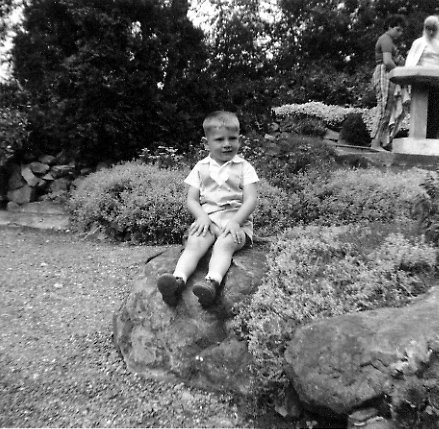I dropped the small, white box into the mailbox at the post office and drove off, wondering what we would find out in a few weeks. After six decades of not knowing anything about his family history, Mike decided to do a DNA test.
He was adopted from a French-Catholic orphanage in Quebec when he was nine months old. He was baptized as Eugene, a name that doesn’t seem to fit him, but maybe that’s because I’ve only known him as Mike. The nuns told his parents a woman had dropped him off, claiming that his mother had left the baby with her to watch and never returned. Maybe the story is true, or maybe she was his mother. The records from that time were destroyed in a fire, which adds to the mystery.
I was always more curious about his origin story than he was in the early days of our marriage. I even searched an online adoption site where people posted ads for missing family members. One person was looking for a brother with a birthdate close to Mike’s, born in the general area near the orphanage. With his permission, I emailed her. She sent a few photos of other siblings she had confirmed were hers through DNA testing. One man looked like he could be related to Mike if I squinted a little, but at the time, he didn’t care enough about finding out to go through the expense of DNA testing to see if he was related.
We read up on the different tests available and ordered one from Ancestry. He followed the simple instructions of spitting into a tiny bottle, twisting the lid on which released a chemical stabilizer, and putting it back into the pre-addressed box. It’s hard to believe that a few drops of saliva might unlock the hidden story of where he came from. I guess we’ll know soon enough.
I have always known where my family comes from, on both sides. I’ve spent time on Ancestry digging around, finding World War I draft cards, yearbook photos, newspaper clippings, and census records. I connected with a distant cousin who lives in the Netherlands and has traced our mutual Dutch lineage back to the 14th century in Holland. I also have tangible items from both sides of my family. I can show you tiny wire glasses my dad’s grandfather wore as a pharmacist in Chicago, along with the old wall clock and glass cabinet he had there. A giant oil painting we call “Eloise” hangs on the wall of my office, my maternal grandmother’s prized possession. There’s an antique music box my paternal grandfather restored sitting on top of the piano I grew up playing. Pieces of my family history decorate and fill the nooks and crannies of our home.
Tonight, as we walked the dogs, I mentioned I got a text from Ancestry confirming they received the kit at the lab. We talked some more about why he’s curious now, at this time in his life. It’s not that he wants to be a long-lost son or the brother someone didn’t know they had. He’s not even sure he’d reach out if he found he had living family members. (I think he would, but we’ll cross that bridge when we get to it.) He’s curious to discover what his ethnic origins might be, and whether he has any genetic relatives out there who might unravel the story of how he got here. But he knows whatever he discovers, the person he is today was shaped by the family that adopted and raised him and the life he has made for himself and with me. Nothing will ever change that.
Prescott-area resident Kelly Paradis is a community liaison for Good Samaritan Home Health, Hospice & Marley House. She loves listening to and writing stories about life.

